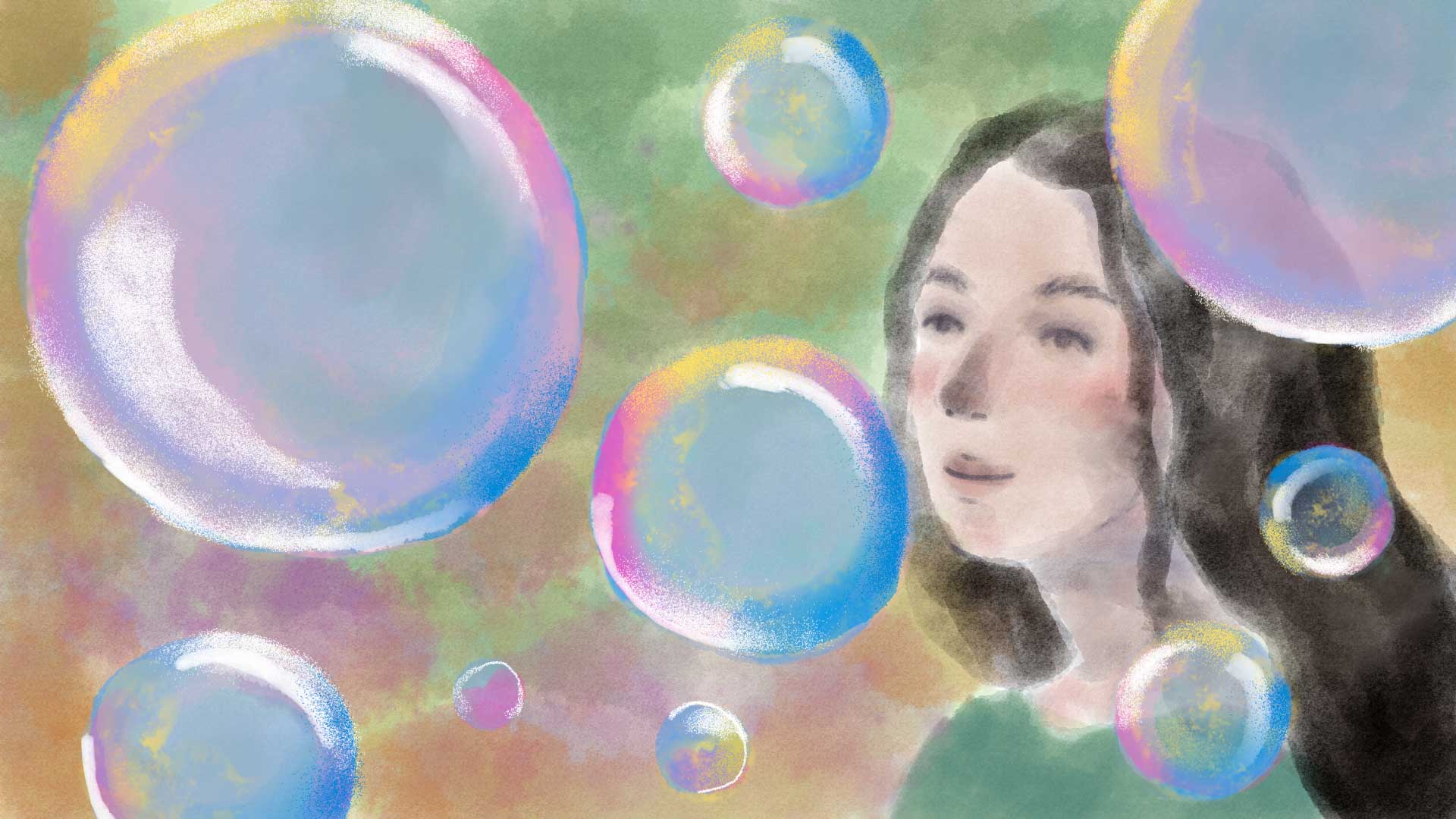

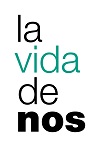
An occupational therapist, Erika Lezama left Venezuela for Perú with the expectation that she could continue to practice her profession. Having overcome more than a few bumps in her road, she finally landed what she thought would be the job of her dreams at a children’s therapy center located in the most exclusive area of Lima. The challenging experience made her realize the kind of professional she wanted to be.
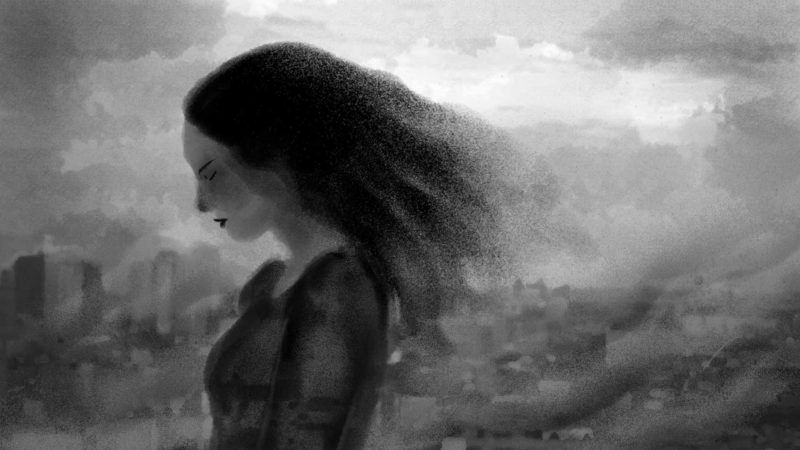 ILLUSTRATIONSS: CELINA GUERRA
ILLUSTRATIONSS: CELINA GUERRAI couldn’t believe it when they offered me a job in Acuarela. The therapy center was located in Miraflores, the most exclusive area of Lima, where I was trying to make a life for myself. It was an approximately ten-minute drive from home. Acuarela’s facilities were phenomenal and state-of-the-art. A glass wall separated the individual activity rooms from the waiting room, so the parents could watch their children in action. The room I was assigned was quite spacious, unlike the small ones in the other centers where I had worked before. It had a mirror that took up the entire wall, which they told me was installed under the rigorous municipality standards in place for child care facilities.
On my first official day of work, they walked me through the workplace dynamics and told me that the center’s staff included a speech therapist, an arts teacher, an educational psychologist, a psychologist, and two educators. I would be joining the team as an occupational therapist. Occupational therapists are needed in centers like this. We treat children with limits in their ability to perform basic functions, with or without a diagnosis. They also told me that, once or twice a week, they organized activities such as going shopping or cooking in the center’s facilities so that the kids could work on different skills.
I was on cloud nine on my way home. I think anyone on the street would have noticed. And I was that ecstatic because I know the things you can achieve when you work with a multidisciplinary team, and also because it was a high-paying job.
I had had to overcome many a setback to get to that point and I finally felt that I was going in the right direction.
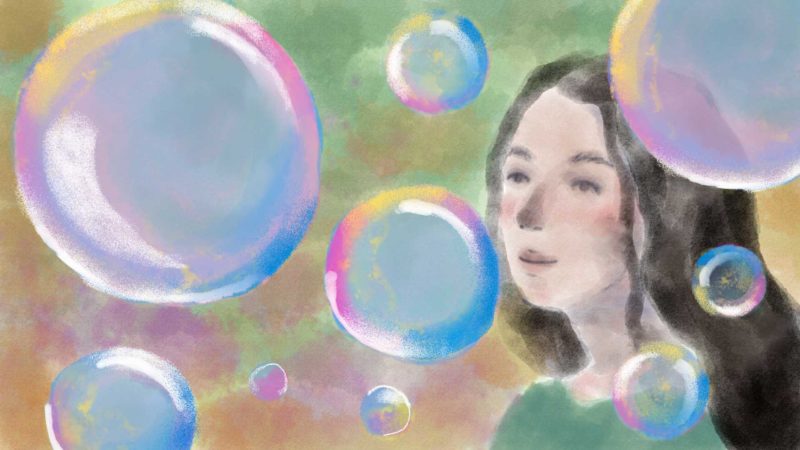
In 2017, after much thought and consideration, I decided to migrate to Lima with my boyfriend. I was working as a therapist in Caracas, but my salary barely bought me toiletries and bus rides. I didn’t have many patients. And I was completely baffled by the fact that, because I had to wait for hours for a bus to pass, it took me longer to get to the therapy clinic than to actually treat the children.
I really didn’t want to leave my country, but I was tired of such a hopeless life. So, when my boyfriend got a job opportunity in Lima, we started making plans for the move; although that job offer didn’t materialize, we went ahead with our plans anyway.
I left Venezuela in November 2017. I cried all the way from the moment the bus started until I fell asleep who knows how many hours later. I was leaving my parents, my brother… I hadn’t even received my university diploma. I was as if in a trance, but I was holding on to one idea: I would work hard and I would be back for my graduation ceremony at the Central University of Venezuela, which would take place in July of 2018.
When I arrived in Lima, my goal was to get a job in my field. I knew it was not going to be easy, so I was open to the possibility of doing other things that would allow me to make a new start. I went looking for a job the very next day; I was exhausted, but I felt I had no time to rest. I distributed copies of my resume, even if I had no clue about how things worked there or how to get places.
That same week, much to my surprise, I got a call from a therapy center. The day of my job interview I came back home with the uniform they gave me. I put it on, took a picture, and sent it to my family in Venezuela. It was my way of telling them that I had started this new life on the right foot. My mom cried tears of joy.
It had been only three days since I arrived, eager to take on the world, and I already had a job. I was jubilant, and for all the right reasons: a migrant like me, a newcomer, was practicing her profession. What more could I ask from life?
Much more, I would find out later. The center was located in a gloomy district a very long distance from where I lived (you have to cover long distances to go anywhere in Lima), and I would be poorly paid; in fact, I would be paid less than the others because of my being Venezuelan. But it is what it is, and I was not going to say no. I was grateful. We all have to start somewhere.
Two months later, just when I thought I was getting the hang of things, that I was adapting myself, I was given a couple of news.
The first one was that my graduation ceremony would be in a month. They had moved it up. I was really looking forward to attending it. Many people though it was a foolish, whimsical thing on my part and an experience I had to forgo because I had made the decision to leave the country.
I couldn’t disagree more.
It was an opportunity to hug my family, whom I missed dearly.
It was a way to treat them with some happiness, which they desperately needed.
The other one was that my mom had relapsed from a cancer from which we thought she was completely in remission following her surgery in February 2017, months prior to my trip. And now she would be needing chemo and radiation therapy. More than ever before, I wanted to be with my family, particularly in moments like those.
And I made it. I had always traveled by myself or in the company of friends for relatively long periods, and this time I had only been away from my family for four months, but it felt incredible to be together again. It was love beyond words. I thought of the saying: “You never know what you’ve got till it’s gone.”
It was a memorable week. We went out as a family. I attended my graduation ceremony in the Aula Magna, as I had dreamed of; it was there where my brother had been awarded his diploma as a journalist years before. There was no big party. I didn’t want one and I didn’t miss having one. Instead, we had an intimate, heartfelt, beautiful celebration. We went out to lunch and came back home to share as family.
That was all I needed to be happy.
And after those love-filled days, with the strength that comes from knowing you are loved, I returned to Lima.
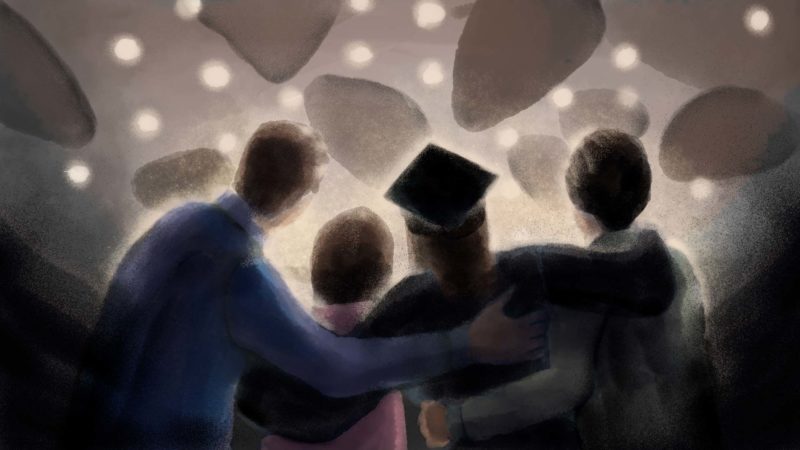
I was supposed to get back to work, but, as it turned out, I had no job. When I arrived, there was someone else in my position. With no time for regrets, I started looking again and I got one in a therapy center. But when I was adapting myself to it, my mother passed away; it happened one month after my graduation ceremony.
I was utterly devastated, but I found some solace when a group of friends lent me money so I could go back to Venezuela to say goodbye to my mother. I attended her funeral. Life has its own ways: the same people who had hugged me for my graduation weeks before, were now hugging me offering their condolences.
A month later, more confused than ever, more lost than ever, uninspired and sad, I went back to Lima, “The Gray City”, as they call it.
As gray as I felt.
A friend from Ecuador recommended me for a position as a sales representative for scales, which was addressed to workers in the healthcare sector. That’s why she recommended me for it. It was a very important German company called SECA. I started working with them because none of the other therapy centers would wait for me to solve my family issues. I didn’t like the job, but it gave me a little sense of balance in the middle of the storm.
I started to build a contact base. I met a therapist I was following on Facebook. As I saw that he was doing a nice work, I had the audacity to write to him asking for a job. We met several times and he provided me with guidance. That’s how I managed to work again in my field of expertise. I landed a job in a therapy center that was approximately a two-hour drive from home. I didn’t stop handing out resumes, hoping to find something closer, and that’s how I arrived at what I thought would be the job of my dreams, the one in Miraflores, the one from which I left that first day ecstatic and in awe.
On my second day at the center, I was told I had to see all the children at the same time. It was a group of about twelve kids with different ages and diagnoses. I explained to the managers how I worked and the methods I used. I insisted to them that I could not tend to the needs of those children with disabilities in the best possible way if they were all together. But the management wasn’t of the same mind. So, we divided the kids into two session groups: one for the smaller ones and one for the older ones.
It was hard. First sessions should always be conducted on a one-on-one basis to facilitate accurate assessment of a child’s condition, but, for whatever reason, that initial evaluation was not a priority for the center. I insisted again that without a meticulous report we would not be able to measure the kids’ progress. They finally caved in and let me evaluate each child individually.
As time went by, I saw some things that made me lose enthusiasm, like the fact that the teachers watched and commented on soap operas and showbiz programs while at work, or that sometimes they would yell at the children, or that on the days when we went shopping with the children, the only thing they were concerned about was their safety —which, in my opinion, had nothing to do with therapy.
I remember the day they slapped Sebastian, a tall, chubby little boy with numerous disabilities who had been diagnosed with autism, because he had peed on himself. “All he wants is our attention,” they argued.
And the day when Mateo, a child with behavioral issues, had a crisis. Their approach was to yell at him very loudly. He did calm down, but it was out of fear and not because the root of the problem had been addressed.
Time and again I would ask myself whether I really wanted to continue to work there.
Could I make things better? Should I talk to the parents? Should I stay or should I leave? I had many questions and just a few answers. In the end, I chose to do what I knew how to do, the best way I could, because I wasn’t allowed to contact the parents; and even if I had, how could they believe me, a newcomer, if I told them that the center, that seemingly top-notch center, operated like that?
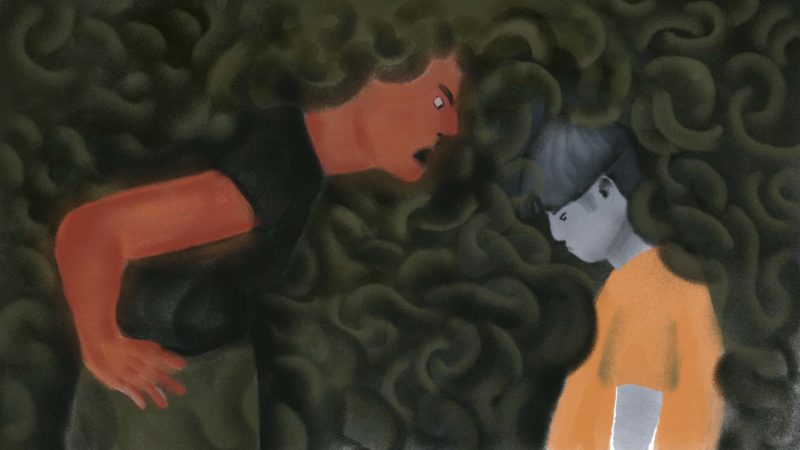
Things got more complicated. They had opened a WhatsApp group to communicate with the staff. One day, they told us that we needed to submit a report on each child the following day because they were going to meet with the parents. Since they didn’t address me directly, I assumed it was for the other staff members. Later that afternoon, they summoned me and asked me for my reports.
That was the straw that broke the camel’s back. “I don’t have them. Reports on what, if you never asked me to reevaluate the kids,” I told them. They expected me to write and submit reports on the basis of evaluations they never allowed me to perform in the first place.
They listened to me, but they still asked me to prepare the reports.
I didn’t know what to do. I decided to use the initial reports (the ones I also had to insist on), which I changed based on what I remembered about each child. I had to bypass the evaluation protocols and I felt terrible. I did not want to be a mediocre therapist. I couldn’t take proper care of children like that, as if they didn’t matter.
But I went on with my work. Of course I was frustrated, but at the same time I was happy to see how much the kids enjoyed my sessions and that my work would definitely help them improve their skills. In my opinion, to help children perform daily life activities the best they can and improve their abilities is a way to change the world. That’s why I love this job.
However, the kids’ progress was not as significant as I would have loved it to be. Most of the children were severely disabled and would have benefited a whole lot more from one-on-one sessions followed by group therapy. But that was all the center allowed us to do. And I was doing my best.
And then came December 2019.
We were invited to a gathering where they would make an important announcement. And the big announcement was that the center would close shop. The reason they gave us was that the founding partners wanted to explore new horizons. I think they were never interested in the center functioning as it should. But, deep inside, I was relieved. I hoped with all my heart that the kids could find a place where they would be provided the care they deserved.
After a while, I was contacted by the mom of one of the girls I treated at the center. I had no idea how she got my number, but she asked me to continue working with her daughter Clara —or Clarita, as she used to call her affectionately—, a really sweet teenager who had been diagnosed with autism. I remember that we blew bubbles to call her attention and encourage interaction. She had trouble working in groups, but this kind of activities made group working easier for her if she engaged in them first. She needed help. She was 14 and needed help to perform most of her activities. I was able to work with her in the way I thought best, following the evaluation protocols as appropriate. In the initial interview, Clarita’s mother told me that the girl had received therapy from a very early age and that she only wanted her not to lose the few skills she had acquired.
We started therapy at home. She would wait for me at 9:00 am sharp in her building’s playground, carrying a bottle of water and a handkerchief with which she wiped off her sweat. When she saw me, her face would light up and she would make motor stereotypies, which are repetitive movements without any purpose or sense that we addressed later on in therapy, to express her joy.
A few months later, not only had Clarita not lost the skills she already had, but she had acquired basic skills that even her mother thought she would never have… like tying her shoelaces. She was progressively trying to communicate more and talked to me about friends and recognized me as a friend, which was a sign of improvement as far as her social skills was concerned. She could even solve a few simple problems, but our greatest achievement was that she was able to improve her coordination and balance and she got to do a number of things, including riding the bicycle her mother had bought her some time before without any hope that she would actually use it, jumping rope, making her bed, and helping in the kitchen washing and cutting vegetables.
Eventually, she was discharged, and I was thrilled.
Four years after having moved to Perú, I returned to Venezuela with my partner. The journey, with all its ups and downs, showed me the kind of professional I want to be and solidified my vocation. Now I am back in my home country, eager to put my knowledge to the service of kids. Via my Instagram account @aprendejugando, I promote proper care for the little ones. It is, as I said, my way of making the world a better place.
I know of no other.
 This story was written within the framework of the “Narrative Medicine: Our Bodies also Have Stories to Tell” course taught to healthcare professionals via our El Aula e-nos online training platform.
This story was written within the framework of the “Narrative Medicine: Our Bodies also Have Stories to Tell” course taught to healthcare professionals via our El Aula e-nos online training platform.
1085 readings
I am a social worker and an occupational therapist from the Central University of Venezuela. I believe that children can learn by playing. I also believe that teaching them how to face life is a way of changing the world. I have worked in pediatrics in Venezuela and Perú.